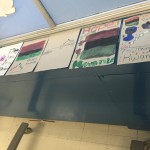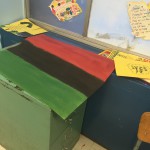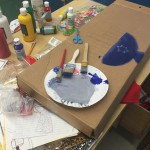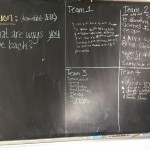By Robine Jean-Pierre
Growing up, I heard Haitian Creole and English spoken interchangeably at home. My knowledge of Creole started off as a collection of simple words and phrases pertaining to cuisine, the household, and hygiene. Unfortunately, I soon developed the regrettable habit of hearing a question or statement in Haitian Creole and responding in English. As a result, I’ve always understood more Creole than I can actually speak.
Taking up French in sixth grade drastically increased my Creole vocabulary. Many people I’ve come across expected it to be the other way around–in other words, that knowing Creole first would have helped me learn French. (My eighth grade French teacher used to exclude me from competitive games during class because she thought I had an unfair advantage.) In truth, my analytical mind started to make connections between the original French terms and the cognates that derived from these. For example, du riz in French means “[some/of] rice” and I realized that this was where the Creole diri came from. (If you’re interested in more on this, consider reading An Nou Palé – Let’s Talk.)
By the end of high school, I had taken French for six years and Spanish for about two (just for fun, since I loved it so much), so that means I have four languages under my belt. However, I’d be lying if I said I could speak each one (aside from English) 100% fluently! This fact embarrasses me, and I often ask myself, Is it the flawed education system? Is it me? Did I ever really learn?
The answer is simple: PRACTICE. For all my theory and knowledge and textbook smarts, I have not always taken advantage of real-life opportunities to practice–and by this I mean live, on-the-spot, spoken communication. I figure that if I’m not speaking Creole as fluently as I’d like to, it’s because of my own timidity, but most heritage speakers have the same struggle. I was always afraid that I would be mocked for pronouncing something wrong or fumbling a sentence, which kept me from trying. (Being condescending is somewhat ingrained in Haitian culture, so my fears were well-grounded.)
It bothers me that I am familiar, yet not fluent, with these three languages other than English (LOTEs); but what I need is to get bothered enough to actually do something about it. Plus, nothing pushes you more than having a sense of “need” rather than just “want.” I’ve been considering multiple measures: getting language-learning apps like DuoLingo; finding friends who speak the desired language and striking up a conversation; and replying in Creole to my family’s questions (which, of course, would take a whole lot of guts).
For French and Creole, especially, I know that most of the words are stored up in my brain somewhere, so it’s just a matter of excavating them. My worst nightmare would be to lose what it took so many years to learn, especially since it’s harder to learn new things as you get older. In the future, I hope to travel to communities that speak any of the three LOTEs, and be able to communicate comfortably. Languages are like keys that open the doors to other worlds, and I wish to hold onto those keys as tightly as I can.







































